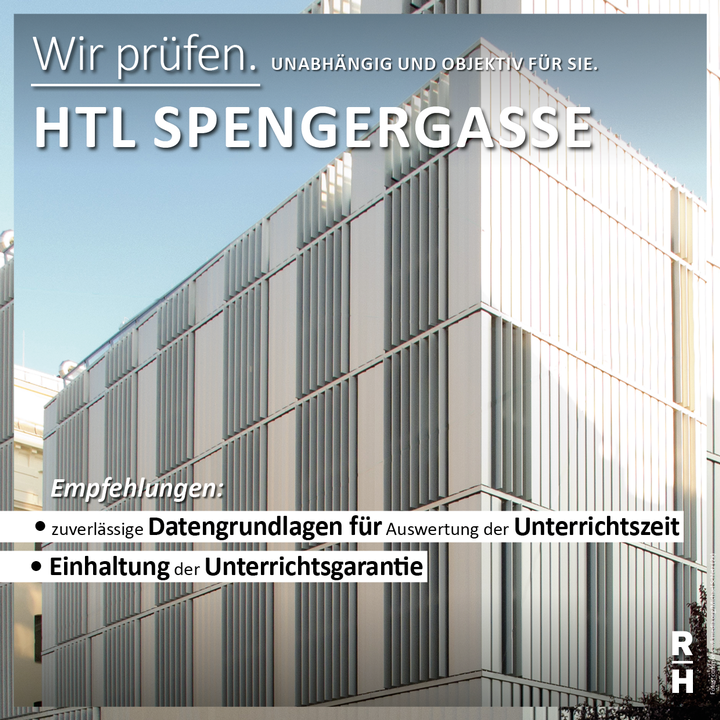Austria's school system remains complex

In its report published today on the "Higher School of Technology Spengergasse", the Austrian Court of Audit (ACA) notes that also the education reform 2017 failed to bring the entire school system under one roof – namely within the remit of the education directorates. The Higher School of Technology (HTL) Spengergasse in Vienna, which is a central education institution, is falling within the internal management remit of the Federation. In short: it operates under the authority of the Federal Ministry of Education. The central education institutions create parallel structures that render the Austrian school system more intricate and complex.
The audit spanned the school years 2015/16 to 2018/19 or the calendar years 2015 to 2018. The audit was carried out prior to the COVID-19 pandemic and its implications on schooling.
The ACA sees the continuation of the research institute’s activities with concern
The HTL Spengergasse provides a broad range of modern training in various areas, such as computer sciences, interior and surface design, media design, biomedical and health technology and industrial engineering. Attached to the HTL is furthermore a research institute for textile technology and computer sciences – i.e. a testing, assessment and training institute – for these areas. The research institute was established as a cooperation partner for businesses and was to provide support for a practice-based training. However, the ACA considers the further development of the research institute to be of vital importance for its continued existence. The reason behind this argumentation: in addition to the losses incurred since 2015 and the downward trend in revenue generated through textile technology, hardly any teaching staff will be available for orders in this area in the medium term. Moreover, the audited period saw hardly any orders in the area of computer sciences and no cooperation between the school and the research institute. According to the ACA’s view, strategic considerations on the future positioning and further development of the research institute are imperative.
Teaching guarantee: the ministry and the HTL Spengergasse had differing data
Since 2005, all Austrian schools have been obliged to guarantee teaching. This means that cancellations of only a maximum of five per cent per subject and, in total, five per cent per class are tolerated. At the time of the audit, neither the HTL Spengergasse nor the Federal Ministry of Education had reliable data on the actual number of teaching hours at their disposal. The available data furthermore deviated markedly from each other. It is therefore not known how many of the planned teaching hours were used for specific subjects and how high the rate of the cancelled teaching hours was. The auditors criticize that no regular monitoring was carried out despite the fact that the principle of guaranteed teaching was established already in 2005. The ACA's recommendation is therefore as follows: the Federal Ministry of Education should create a reliable basis for uniform data for the evaluation of the actual teaching time and provide the schools with detailed evaluation tools that take into account all reasons for cancellations. Furthermore, the ACA recommends to the HTL Spengergasse and to the Federal Ministry of Education to assess, at regular intervals during the year, whether the principle of guaranteed teaching is complied with as regards each subject, class and school in order to take timely countermeasures in the case of increased cancellations.
It is not plausible why the HTL Spengergasse remains within the central internal management remit of the ministry
While academic secondary schools as well as intermediate and higher technical and vocational schools are managed by the education directorates, the five central education institutions operate under the authority of the Federal Ministry of Education. The reasons for this are historical. The fact that the central education institutions fall under the direct authority of the ministry has implications on the pupils and the staff. The parallel structures that are created by the central education institutions contribute to the complexity of the Austrian school system. However, the central education institutions are characterized by the fact that teachers have a more favourable access to resources. This favourable situation compared to the Austrian average should be maintained if the competence for the central education institutions is shifted from the ministry to the education directorates. The ACA recommends the following: the Federal Ministry of Education should weigh up the advantages and disadvantages of central education institutions operating under the authority of the ministry and include a financial comparison of the central education institutions with the federal schools. If need be, the respective stakeholders should coordinate a cost-neutral shifting of the central education institutions to the respective education directorates.
- pdf Datei:
- 5,441.8 KB
- Umfang:
- 128 Seiten
Report: Higher School of Technology Spengergasse (in German)
From May to July 2019, the ACA audited the financial management of the Higher Federal School of Technology and Research Institute for Textile Technology and Data Administration Spengergasse in Vienna. The audit aimed at assessing the educational offer as well as the development of the number of pupils and graduates, the organization, the deployment of staff under consideration of the actual teaching hours, the added value of the research institute for the school and the financial development. Furthermore, the ACA analyzed the effectiveness of the direct management of the central education institutions by the Federal Ministry of Education, Science and Research. The audited period spanned the school years 2015/16 to 2018/19 or the calendar years 2015 to 2018. The audit was carried out prior to the COVID-19 pandemic and its implications on schooling.


